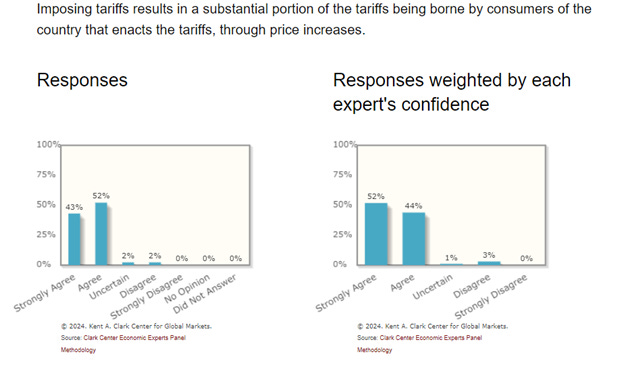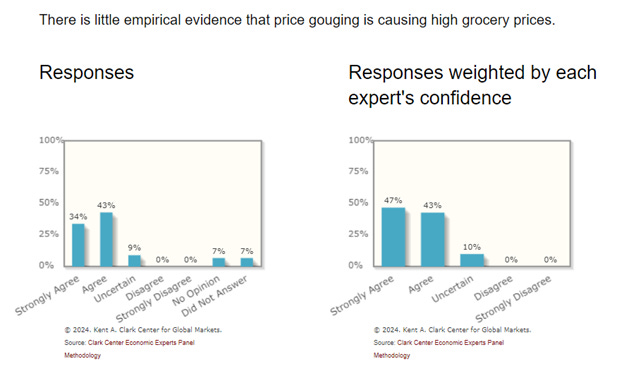Economists’ Damning Verdict on Both Presidential Candidates’ Pricing Policies
Kent Clark survey group oppose Fed politicization, tariffs, and price controls
One of the underappreciated costs of high inflation is that volatile prices encourage bad policy responses.
We’ve seen this in the presidential election. Former President Trump has used dissatisfaction with the cost of living to muse on the idea of the president having a more direct role in setting monetary policy. Vice President Kamala Harris, on the other hand, has dabbled with kook theories implying high inflation was driven by corporate greed or price gouging. This is the “intellectual” fuel behind her promise of rent control and anti-price gouging laws for groceries.
A new survey of the 44 prominent economists in the Kent Clark U.S. Economic Experts panel reminds us that economists overwhelmingly reject these ideas as nonsense.
Asked whether “Giving the President more direct influence over monetary policy would lead to substantially worse monetary policy decisions,” 94 percent of respondents either strongly agree or agree. The actual agreement is over 96 percent, because it’s clear from his written response – in which he complains about President Nixon leaning on the Fed - that Professor Kenneth Judd misread the question and meant to vote “Strongly Agree” rather than “Strongly Disagree.”
Next, despite President Trump’s claims to the contrary, 95 percent of economists surveyed agree too that “Imposing tariffs results in a substantial portion of the tariffs being borne by consumers of the country that enacts the tariffs, through price increases.”
Yes, respondents acknowledge that, theoretically, who bears the cost of a tariff depends on the supply and demand elasticities for the product. But, as Professor Chad Syverson notes, “Only in a polar case is importer's share zero. Empirical evidence…says importer typically bears a lot” – a point my colleague, Scott Lincicome, elaborated on this week, as part of a devastating take down of President Trump’s tariff proposals.
It's not just President Trump’s ideas that get a big thumbs down from the economists, however. Asked to react to the sentence “There is little empirical evidence that price gouging is causing high grocery prices,” 77 percent of those polled agree or strongly agree. Crucially, 0 percent disagree.
Again, the true disagreement is likely much higher than these results imply. That’s because 14 percent of the sample, having answered the first two questions, opted to state that they had “no opinion” or simply didn’t answer this question (or the next one). I suspect that there was an unwillingness on the part of some surveyed to be implicitly critical of the Democratic candidate so close to an election. Of course, there are no such qualms about publicly objecting to Trump’s policies! And even several of those “uncertain” answered that way JUST because they were unclear of what “price gouging” meant in this context.
Unsurprisingly, given their long, destructive record of failure (detailed in The War on Prices), 88 percent of the economists surveyed also agree that the “Widespread use of price controls creates substantial economic distortions.” Weighted by confidence and limited to those who answered the question, that increases to 99 percent: a damning indictment not just of Vice President Harris’s push for national rent control and capping grocery prices in emergencies, but the broader proliferation of price controls we’ve seen across local, state, and federal government.
As Professor Darrell Duffie pithily summarized, price caps, the most common form of price control, “stifle supply and allocative efficiency.” In fact, as The War on Prices documents, price controls can have other damaging effects, like reducing the quality of products and deepening black markets too.
This survey was published on Tuesday, the same day as the Presidential debate. As I mentioned earlier in the week, the ABC moderators of that debate challenged former President Trump on his tariff plans by citing expert opinion, explaining that economists believed a large part of his tariff burden would be passed on to American consumers through higher prices. It’s a shame, but perhaps not surprising, that ABC didn’t challenge Harris similarly on her price control proposals.








For me the really important issues are encouraging more high value immigration and deficit reduction. Democrats are weak on these issues but Republicans are positively pernicious. One can at least fantasize about democrats moving toward more merit-based immigration and raising revenue. Republicans want to move in the opposite direction. (No, I do not take Trumps tariffs for revenue statements as a serious fiscal policy)